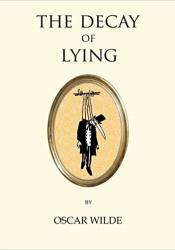Oscar Wilde's "The Decay of Lying"
In 1891, Oscar Wilde (1854-1900) published a collection of four essays titled Intentions contained his most elaborate defense of his aesthetic philosophy. among the essays was The Decay of Lying, a piece he had since revised yet had published two years prior in The Nineteenth Century, a British monthly literary magazine. The essay contains a Socratic dialogue between two characters, Vivian and Cyril, in which Vivian puts forth his aesthetic philosophy that reflects Wilde’s and pronounces that the decline in the literature of the time is due to the decay of artists’ ability to lie about the world. Vivian’s “final revelation is that Lying, the telling of beautiful untrue things, is the proper aim of art”. Wilde’s essay preceded modern scholarship in psychology and neuroscience which provided evidence for his claim that the world is inevitably shaped by our own perception. With this realization, all art of conceptualization is based off of a lie, and thus this lie should be embraced.

